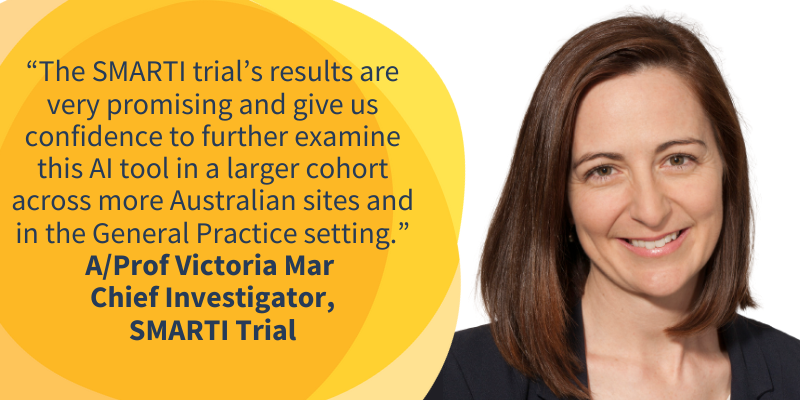If caught early, melanoma and skin cancer can be cured, but diagnosis can be challenging as Australia’s chronic shortage of dermatologists and additional pressures on General Practice are significant barriers to accessing life-saving early intervention.
One solution is to better equip GPs so they can accurately assess suspicious moles and lesions, and artificial intelligence (AI) technology could be a crucial part of their toolkit.
In a pilot study published by the Journal of the American Academy of Dermatology, digital photography combined with the newly developed MoleMap AI algorithm was shown to have substantial agreement with a treating dermatologist’s face-to-face assessment of whether a lesion was benign or malignant, and accuracy that compares favourably to that of a dermatologist’s remote (telehealth) assessment.
The ‘SMARTI’ trial was conducted across two Melbourne dermatology clinics, the Victorian Melanoma Service at The Alfred and the Skin Health Institute, and examined images of 743 skin lesions from 214 participants.
Lead investigator, A/Prof Victoria Mar of Melanoma and Skin Cancer Trials said the trial was the first step in developing improved early detection technologies for GPs, telehealth clinics and skin cancer clinics.

“With only 550 practicing dermatologists in Australia, mostly in metropolitan settings, we urgently need to ensure all Australians can access reliable diagnostic advice, regardless of where they live,” A/Prof Mar said.
“The SMARTI trial’s results are very promising and give us confidence to further examine this AI tool in a larger cohort across more Australian sites and in the General Practice setting.”
“Testing this technology in regional Australia would also provide more equitable access to cutting-edge early interventions and help obtain the large-scale data we need to be confident that the algorithm will have a positive impact on improving patient outcomes,” she added.
The AI algorithm was developed by MoleMap and the Monash eResearch Centre. The trial was coordinated by Melanoma and Skin Cancer Trials (MASC Trials) at the Monash University School of Public Health and Preventive Medicine, with funding contributions from the Victorian Medical Research Acceleration Fund and MoleMap. Alfred Health and Skin Health Institute were participating sites. Since the trial, the algorithm continues to be developed under the new technology group known as Kāhu.
A/Prof Mar is director of the Victorian Melanoma Service at The Alfred and an Early Career Fellow at the School of Public Health and Preventive Medicine, Monash University.


